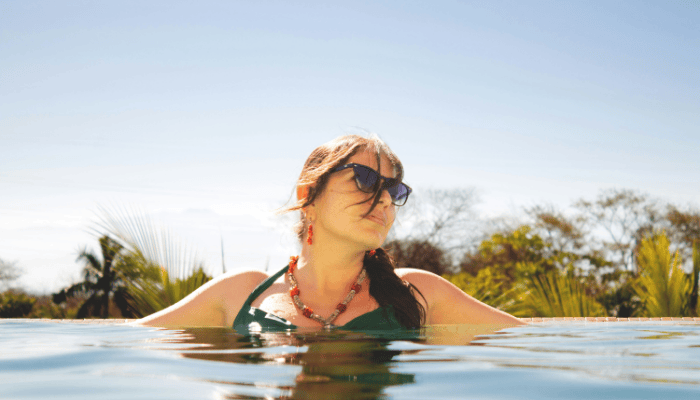Key Takeaways
Most pools in Portugal, even above‑ground or inflatable ones over a certain size, require municipal approval and a building permit.
Start with a Pedido de Informação Prévia (PIP) from your local Câmara Municipal to check if your land is eligible for a pool.
Legal construction needs certified plans, a building license, and compliance with land‑use rules (watch out for REN/RAN restrictions).
Safety measures like fencing, self‑locking gates, and covers are increasingly required, especially if renting your property.
Pools used commercially (guesthouses, Airbnb) must follow strict water testing and maintenance standards set by health authorities.
Regulations vary by region. Always confirm local rules rather than relying on generic advice.
When buying property with a pool, verify permits and registration, illegal pools can lead to fines or even demolition orders.
Non‑compliance risks include heavy fines, blocked property sales, voided insurance, and enforced removal.
Keep thorough records, involve a lawyer early, and never assume builders or sellers have handled all paperwork.
Following the rules from the start saves you from expensive legal trouble and ensures you can truly enjoy your pool.
Portugal might be famous for its sunshine and surf, but if you’re picturing yourself sipping wine by your private pool in the Algarve, there’s one unglamorous but crucial detail you can’t overlook: swimming pool regulations in Portugal. Not exciting? Maybe not. But absolutely essential? Without a doubt.
Whether you’re restoring a rustic quinta or building a modern villa from scratch, ignoring the swimming pool regulations in Portugal can lead to fines, legal troubles, and a dry, pool-less backyard. And yes, even temporary or above-ground pools can fall under these regulations, inflatable doesn’t mean exempt.
The tricky part? Every municipality has its own version of swimming pool regulations in Portugal, and they’re often not available in English. That’s where things get confusing, and where we come in.
If you’re a property owner, buyer, or investor trying to avoid drowning in red tape (or draining your savings on surprise penalties), you’re in the right place. We’re going to break down everything you need to know about swimming pool regulations in Portugal, from permits and paperwork to safety standards and what really matters.

Do You Need a License for a Swimming Pool in Portugal?
Short answer? Almost always, yes.
If you’re thinking of adding a swimming pool to your property, you can’t just grab a shovel and go full DIY mode. In Portugal, pool construction is considered a “construção” (structure) under national planning law. That means it typically requires approval from your Câmara Municipal (local council).
Whether it’s in-ground or above-ground, chances are high that some level of municipal licensing is needed. Even portable pools can trigger compliance issues if they exceed a certain size or remain in place long-term. That’s not a loophole, it’s a trap.
Start by contacting your local council for a PIP (Pedido de Informação Prévia), which is a pre-approval check. This gives you clarity on whether your property qualifies for pool construction.
Useful link here: https://dre.pt (Portuguese legislation portal – search “piscinas particulares”).
Planning a Swimming Pool in Portugal?
Building a Pool: Legal Requirements
So, you’ve got the land, the sunshine, and the Pinterest board. Now comes the paperwork.
To build a pool legally in Portugal, you’ll likely need:
- An architectural plan drawn up by a certified professional
- A building permit (Licença de Construção)
- Approval from your local Câmara Municipal
Expect a review of everything from soil composition to drainage routes. It’s not just about the pool—it’s about how it fits into the wider land use.
In some regions, especially coastal or rural zones, you’ll also deal with REN (National Ecological Reserve) or RAN (National Agricultural Reserve) restrictions. Pools on these lands are often a hard no. Or at best, a bureaucratic marathon.
Oh, and if you’re building in a condominium or urbanized resort area? Brace for condo board drama. Always check the internal regulations before you even talk to a builder.
More here: https://www.dreampools.pt/en/permission-for-construction-of-swimming-pools

Safety Standards and Equipment
Portuguese law is steadily catching up to modern safety norms, especially when it comes to kids and short-term rentals.
There’s no national pool safety law, yet. But many local councils, particularly in the Algarve, are adopting stricter rules. That includes:
- Fencing (minimum 1.2 meters)
- Self-locking gates
- Pool covers or alarms
And if you’re renting out your property on Airbnb or Booking.com? You may be required to install safety features. Tourists + pools + no barriers = lawsuit waiting to happen.
Some regions also mandate that holiday homes with pools must display safety signage in multiple languages. Yes, really.
If you want to keep things future-proof, follow AFNOR NF P90-306 standards (French safety norms often used in Portugal as reference).

Water Quality & Maintenance Regulations
There’s no such thing as “crystal clear water” without a few legal strings attached.
Portugal doesn’t have heavy-handed pool water laws for private homeowners, but the moment your pool is used commercially, think guesthouses, rentals, or even Airbnb, you’re entering public health territory.
Public-use pools must meet Direção-Geral da Saúde (DGS) standards, which include:
- Weekly water testing for pH, chlorine, and microorganisms
- Proper filtration systems
- Maintenance logs
Private pools? Still a good idea to test the water weekly, if only to keep your skin from peeling off.
More details: https://www.biopiscinas.pt/en/valores_limites
Regional Variations in Pool Laws
Not all pool laws are created equal. Building a pool in Porto is not the same as building one in Faro.
Northern Portugal tends to be more conservative due to climate, land use, and zoning limitations. For example, the CCDRA (Comissão de Coordenação e Desenvolvimento Regional do Algarve) has guidelines that differ significantly from those in Centro or Norte.
Some municipalities might even waive fencing rules, others will send inspectors. Some allow saltwater pools near protected land. Others don’t. It’s a patchwork.
That’s why local knowledge is gold. Before you build, visit your local Câmara or check their site for downloadable guides. Some helpful municipal links include:

Buying Property with a Pool: What to Check
Buying a property with a pool? Take a pause before diving in.
Here’s a harsh truth: many pools in Portugal are illegal, built without permits, never registered, or in violation of zoning rules. And the liability passes to you, the new owner.
Before signing a purchase contract:
- Ask for the “licença de utilização” showing the pool is legally registered.
- Verify the project approval file with the Câmara Municipal.
- Compare drone images (yes, seriously) with registry maps to detect unauthorized additions.
If the pool’s illegal? You may be able to legalize it through a “processo de legalização”, but it’s not guaranteed. Costs can run into the thousands, and in some cases, the pool may need to be removed entirely.
More insights: https://www.ppproperty.com/page/owning-a-swimming-pool-in-portugal

Consequences of Non-Compliance
You built a pool without telling anyone. What’s the worst that could happen?
Well, here’s a sampling:
- Fines ranging from €250 to €3,740 (and higher for companies)
- Orders to demolish the pool
- Inability to sell your property
- Voided home insurance coverage
Non-compliance isn’t just a paperwork issue, it affects your wallet, resale value, and even your mortgage approval.
Some municipalities are tightening inspections, especially as more foreigners buy property. Local councils now use satellite images and drone surveys to spot unlicensed constructions.
If you inherited a property or suspect the previous owner “forgot” to file the papers, act fast. Legalizing early is far cheaper than litigating later.

Expert Tips & Common Mistakes to Avoid
Some lessons are better learned from others’ mistakes. So here’s your cheat sheet:
- Don’t assume your architect is handling the paperwork. Always double-check.
- Don’t trust what the seller says. Ask for documentation.
- Don’t skip insurance. A pool accident without coverage is a financial sinkhole.
- Do involve your lawyer early. They’ll spot issues before you’re knee-deep in legal mud.
- Do keep every approval and inspection document in one folder. Digitize it too. Bureaucracy loves paper trails.
And finally, if your builder says, “It’s fine, everyone does it this way”, run.
Conclusion for Swimming Pool Regulations in Portugal
Owning a pool in Portugal can be one of life’s greatest luxuries, but only if you follow the rules from the beginning. One missing permit or overlooked safety measure can unravel your plans faster than you can say “Câmara Municipal.”
The bottom line? Always check the swimming pool regulations in Portugal before you dig. Don’t rely on hearsay or friendly advice from neighbors, what João got away with in 2003 won’t protect you today. Each municipality enforces its own version of the swimming pool regulations in Portugal, and they expect full compliance.
Here’s how to stay on the right side of the law:
Contact your local council.
Confirm that your land is approved for pool construction.
Review the specific swimming pool regulations in Portugal that apply to your area.
Hire a licensed architect or engineer to manage the process.
And yes, take a photo of the completed pool, it’ll come in handy for the paperwork.
Portugal respects those who respect the process. And when it comes to pools, trust us: floating legally under the sun is a whole lot better than drowning in legal trouble.
Build it right. Enjoy it fully.
Oásis Biosistema helps you design, license, and build legal, sustainable pools that pass inspection and turn heads.
FAQ
What is the minimum space around a swimming pool?
The minimum space around a swimming pool should be at least 4 feet (1.2 meters) wide to ensure safe access and movement. For larger pools or public facilities, wider clearances may be required by local building codes or safety regulations to accommodate emergency access and poolside furniture.
What are the rules of water safety around swimming pools?
Key water safety rules include constant adult supervision, no running near the pool, secure fencing with self-latching gates, proper signage, and teaching children to swim. Keep rescue equipment nearby and never swim alone. Following these rules helps prevent accidents and drowning around residential or public swimming pools.
What is the length of a regulation swimming pool?
A regulation swimming pool is typically 25 meters (short course) or 50 meters (Olympic or long course) in length. These standards are set by international swimming organizations like FINA for official competitions. Pool width, depth, and lane markings also follow strict guidelines to ensure fairness and safety.
Why are shorts not allowed in French swimming pools?
French swimming pools often ban casual shorts for hygiene reasons. Swimwear must be tight-fitting, like briefs or jammers, to prevent contamination from outside clothing. This rule helps keep pool water clean and is strictly enforced in most public facilities across France.



